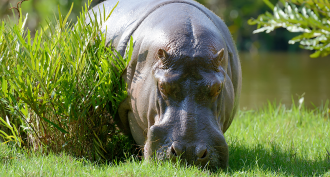Animals
-
 Brain
BrainA dog’s amazingly large vocabulary
A border collie named Rico recognizes a surprisingly large number of words.
By Emily Sohn -
 Animals
AnimalsHippo sweat is natural sunscreen
Hippo "sweat" contains substances that fight microbes and screen out ultraviolet light.
By Emily Sohn -
 Animals
AnimalsPrime time for cicadas
Researchers are tracking down why some types of cicadas emerge in vast numbers only once every 17 years.
By Emily Sohn -
 Ecosystems
EcosystemsFrogs get poison from ants
The skin of some frogs becomes poisonous after they eat certain kinds of ants.
By Emily Sohn -
 Animals
AnimalsNoisy boats may bother orcas
Whale watcher boats may be so noisy that killer whales must change their calls to be heard.
By Emily Sohn -
 Genetics
GeneticsWhat makes a dog?
Analyzing dog DNA is helping to explain the origin, behavior, and diseases of dogs.
By Emily Sohn -
 Animals
AnimalsMale baboons get mellow
Females may get male baboons to tone down violent behavior and become more cooperative.
By Emily Sohn -
 Animals
AnimalsSnagging insects, hummingbird style
A hummingbird has an unexpectedly flexible lower bill to help it catch bugs.
By Emily Sohn -
 Animals
AnimalsGanging up to grab more food
Food-snitching birds may drive wolves to hunt in large packs.
By Emily Sohn -
 Animals
AnimalsSea otters, kelp, and killer whales
Learning more about sea otters can help rescue the animals and save coastal ecosystems.
By Emily Sohn -
 Animals
AnimalsSome birds heed a monkey’s warnings
An African forest bird can tell which monkey alarm calls to pay attention to.
By Emily Sohn -
 Genetics
GeneticsA butterfly’s new green glow
Scientists have tweaked a butterfly's genes to make its eyes glow green.
By Emily Sohn